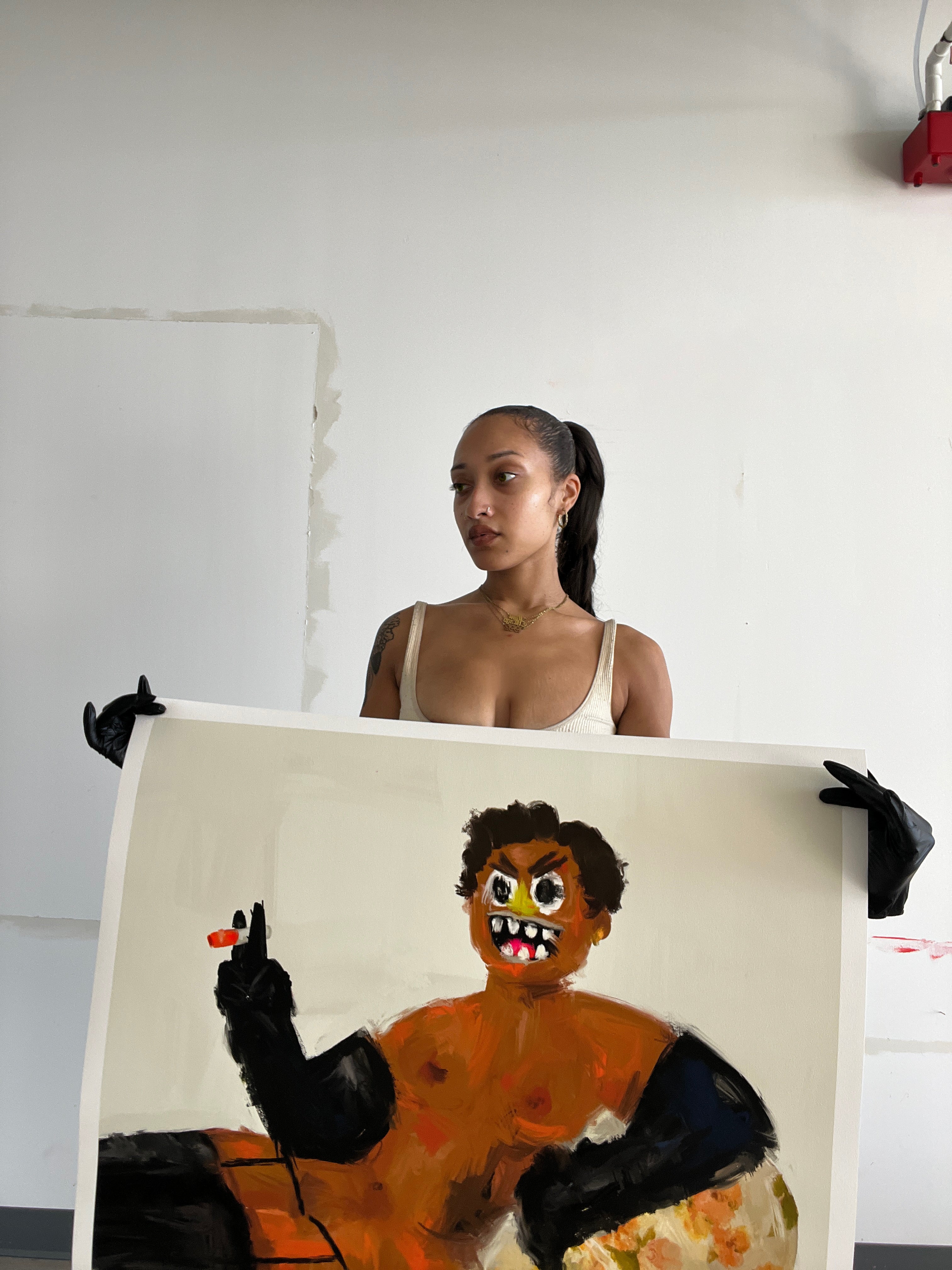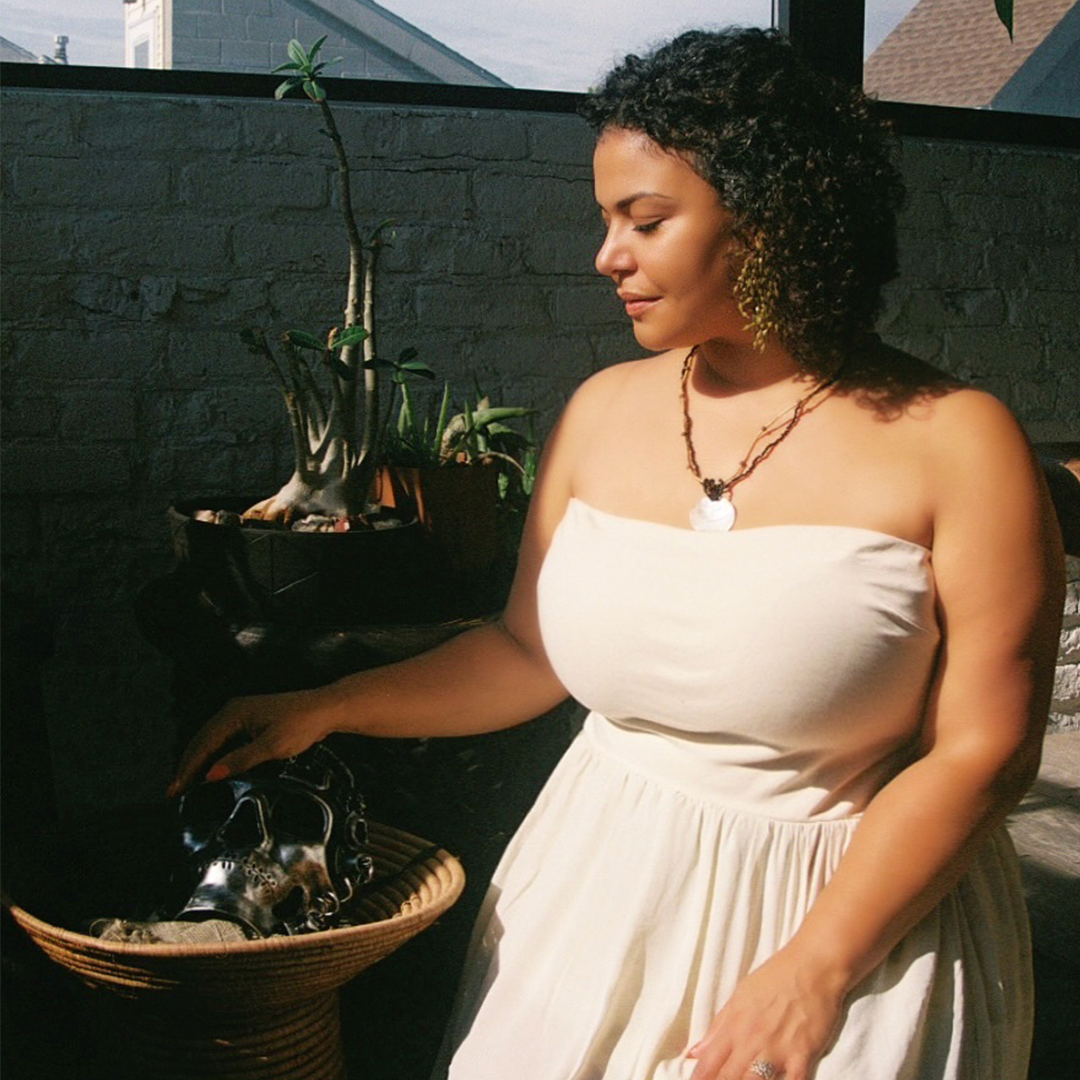When you first see Mía Lee’s art you might be left speechless, uncomfortable even. Are the characters happy? Angry? Ask, and she won’t tell you. But one thing is clear: behind the glaring grins in the South Side Chicago native’s expressive, colorful, almost cartoon-like art is a deep sense of nostalgia and childhood curiosity. Of love and chaos. Human connection and solitude. And at its core, Lee’s personal stories and family lore that tap into her Black and Caribbean roots.
MG: Your childhood plays a big role in your art. What were the early years of Mía Lee like?
ML: I'm a painter, illustrator, designer, anything creative basically. But growing up, I'm so very fortunate I have a lot of artists in my family. My mother painted. She paints now and makes jewelry. My grandmother painted and she's a pianist. My other grandmother is a seamstress, and my mother sews too. Creative people all around me, and all the women that inspire me the most have always cheered me on.
They gave me the freedom to just wander. To explore and go to museums. Not feeling restricted. That was my childhood.
Did you always know you wanted to be an artist?
Honestly, I've never even been interested in anything else. So it's “I got to make this shit work” because I don't know numbers. I'm not good at anything else. It's either art or nothing.
Did you go on to art school?
I think I never got above a D in school. I was just doing me and the teachers were like, “you’re either going to follow directions or else.” I got it. They didn't. They never understood why I couldn't do it. But I'm very persistent. If I feel it, then I'm going to do that. In college, I didn't get into an art program. I went down the costume designer route, and it felt so close to what I've experienced being around my grandma and my mom who would sew. They used to give me scraps of fabric, and I used to make little doll clothes and stuff. Then I went to New York after school and I didn't touch costume design again.
How would you describe your artistic style?
I bring in the characters that I used to draw. I used to illustrate a lot and doodle. To the first glance, it’s kind of weird and grotesque in a way that’s still fun and playful. A viewer doesn't really know how to interpret it at first. Then you really get into it, the facial expressions, and they're kind of absurd. I grew up watching cartoons. I was watching Cartoon Network and Adult Swim when I was super young, and I've always been exposed to more of an adult, dark humor. I feel the dark humor part of me from watching more mature things growing up has carried on into my adult life. I've never been a realistic painter. I've never drawn something exactly how it looks, hence why I never got a good grade in school.
I never knew I could consider that type of style fine art until I started reading more and getting more exposed to artists that came before me, seeing these types of painters with these cartoonist figurative paintings being fine artists, being really respectable.
As the artist, you come in with a point of view. What do you want people to take away when they see your art?
I am very open to interpretation. I don't really put any descriptions into the work because I want people to immerse themselves in it and create their own narratives. I personally have a narrative, which is why all the pieces I create are drawn from nostalgia, from childhood, from experiences current or in the past, or they deal with interpretations of the chaos between humans and relationships—your parents, your significant other, or that relationship that we all experience with one another. It's all love and love and death.
What are some of the reactions you get at galleries?
I really love it at shows when people come to tell me what they see. A lot of people see themselves or see other people they know. I enjoy that part the most. I will never tell them my view because people interpret the eyes and the smile, and some people think it's frightening then other people are like, “oh, it's excitement.”
Can you tell us about one of those personal stories that's reflected in your work?
There's a painting that I really love, which is A Lady from Roatan Always Fixes Her Dinner Last. That one's really important to me because I spend a lot of time around my grandparents. They basically raised me. My parents always worked. My mom's side is from Roatán, which is an island off Honduras. They immigrated to Chicago in the 50s or 60s, and every day my grandmother cooked my grandpa a meal. He worked nights in a parking garage, and they had this routine where she always made this massive meal for him. She would make him this big pile of food, and then she would sit with him and they’d talk. When he left, that's when she ate.
I saw that all the time, like every single day. So in the painting it is two figures and this giant plate of rice and beans, plantains, and avocado. Literally that's what he ate. Then the woman is there smoking. That’s how their dynamic was.
Do you have a favorite meal that your grandma would cook?
She used to make conch fritters. I don't even know how to describe it. I didn't ask many questions. I ask my mom questions now about all the things. What is this called? Who's going to teach me how to make this? Because we need to keep these recipes flowing down. But like, selfishly, I just have to know.
What's your creative process like?
I know a lot of artists go straight for it. And I just can't do that. I want to be free. I sketch all the time. I bring my sketchbook anywhere. I bring the sketchbook to the bar, have a glass of wine, and just sketch. I take one of the sketches—I have so many—so I just pick one and then I start that way if it fits in the proportions of the canvas. I've been told that restricts people from being explorative and free with their paintings. But honestly just because I sketch it first and then put it on canvas does not mean it turns out how I sketch it. Shit happens, you know.
The art world is not easy to break into for anyone. As a Black woman that has to be even more difficult. Do you face those challenges in the art world?
All the time. I feel I'll never not face that. It's always been hard to be taken seriously, and I feel that was my biggest thing. It's such a very typical look of the person who's the most famous and the most pronounced artist. You stick out a lot. I'm not intimidated by that, but it does something to your confidence a little. I do have a lot of confidence, and I will say I'm very proud to be Black and a woman and from the South Side. Being told no, that's something I'm used to. It's not letting the fear that they'll say no hold you back from doing more, or finding more opportunities, or talking to more people.
There's been so many shut doors. I'm not afraid of that. Sometimes it does hit you and it's human to feel that way. I experienced that a lot, especially starting out. Getting bad grades, and then going to school and not getting into the program. You think maybe it's me, and it's like, it's not me. You just have people who don't really see it yet. They need to see the final form of you before they take you seriously.
I think more people are in that mode of taking chances on people that aren't really big names. Before it was always the same person, the same man, who always gets the glory, the shine, and the pedestal. Now, I feel this shift and change to see other people like me being able to get through doors and people taking a chance on them.
Do you have a weed ritual?
I do. And it's funny. When I tell people, I feel it's something a serial killer would do. I just sit there and I listen to classical music. I have a couch that's facing most of the canvases. I'll sit there and stare at them doing nothing, just listening to classical music. I'm a very high anxiety person and I have concrete floors in my studio, so I also just lie there on the concrete. Just still. Yes, it's something else, but also it helps me. It calms me down. Staring at a brand new canvas is super intimidating, and when my mind starts racing and everything, it just helps me a lot.
If you discovered a planet, what would you name it?
I feel I should name it after me. I would say Big Mía because I name all of my devices, my phone and my computer, it's all Big Mía. Something after me for sure. Big me.
What's top on your playlists?
Besides classical music, I love very calming things, or I love something really loud, like rock. I'll listen to The Internet, a lot of Frank Ocean, or sad girl music.
So if you had a dream sesh with two or three other people, who would those be?
I would like to pick Pharrell's brain. I know he smokes. He has to. Who else? I can't think of another person. Pharrell has been in the game for so long. He's probably 150 years old. I feel I would learn so much creatively, musically, clothes, art, everything.
What's your dream project?
I would love to have even more music covers. My grandma and my dad, he's the collector, have a lot of records. They're still at my grandmother's house. She has this old school record player, and they've never given away a single record. They have so many. A lot of the original Prince. I'll smoke with Prince. That's the second one. They have all of the old Prince records, all of the Donna Summer, and real old school disco stuff. I would love to have that, another part of something super nostalgic to my childhood.
So, what's your favorite Miss Grass Times and why?
It's All Times. I have my favorites in different settings, but most of the All Times is perfect because I spend the majority of my time painting and sketching. It’s my go-to because it's old faithful, and I needed something that'll move me around instead of falling asleep or just wanting to just chill and eat.
Any influential artist that you look up to?
George Condo. Basquiat, obviously. He's is the depiction of an artist that wasn't taken seriously as a Black man surrounded by white artists, so definitely him too. I have a lot of friends who are painters now. They inspire me so much. One of my really close friends, Julian Gaines, we basically grew up together drawing and sketching, writing on walls and tagging things. He's a real inspiration because it's close to home and other people seem unattainable, or they're celebrity status. I'll probably never know George Condo, but I know Julian.
How do you define your success and do you feel you’ve had your big break?
No, I don't feel I had a big break. I want to take things as they come and I don't really want to overwhelm myself thinking about if things are moving too fast or too slow. I'm trying to appreciate things as they come. Then as far as success goes, when I buy my parents a crib, a big ass house, I'm done, I'm retiring. No, no. Success for me is more freedom.
Success to me is being able to spread, not a message, but to spread the sense of possibilities. People knowing everything that has come and projects that I've done were never on my list. Like Urban Outfitters, I never thought about me collabing with Urban Outfitters when I was shopping there in high school. Absolutely not.
And I want little Black girls from the South Side to see things. I want to see those little girls in art.






